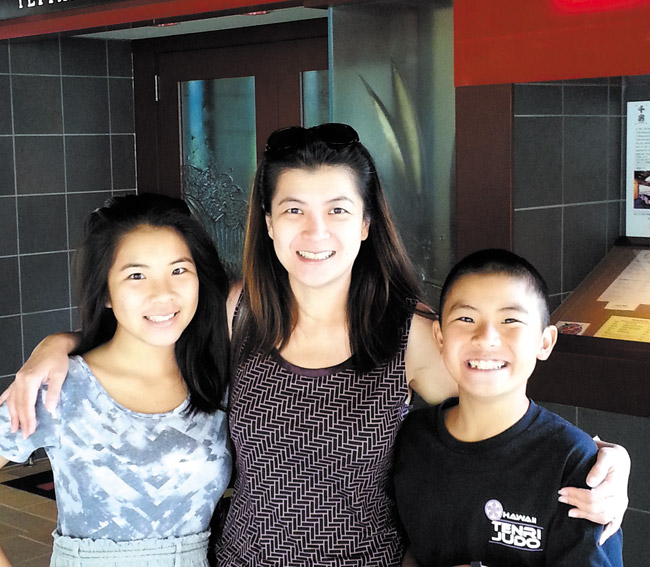The Sacrifices Fathers Make For Keiki

The author’s messiahs, (from left) Skye, Pauline and Stirling Sakashita, with a twist: The one sacrificed is the father | Photo from Jay Sakashita
A father’s love is the best kind of love and is superior to anything else. This is the view promoted in the world religions, as there is no love greater than God’s love, and God is oftentimes portrayed as a father. This message is preached in some form every weekend in numerous churches, synagogues and temples across the state.
Being a father myself, I can understand and appreciate why the gods seek to pattern their love after a father’s affection, for a father’s love is a pure, selfless form of love. It also is a love that involves a sacrifice — and the gods love sacrifices. Indeed, the Buddha gave up his only son; Abraham was willing to sacrifice his; in Hinduism, the beloved Rama was sent into exile by his father; and God the Father sent his to be killed. (Note to fathers: If your god ever asks you to sacrifice your son, change gods. Note to sons: Adopt an older brother if your father responds, “Well, it depends …” to the question, “Would you kill your son if God asked you to?”)
A father’s love, however, is different from God’s love. Most fathers — at least the ones who I know and respect — don’t insist or demand to be the center of their children’s world. They do not desire to dominate their children’s lives or train their children so that they can relive their lives through them and fulfill lost dreams. And fathers don’t punish their children if their children love someone else other than or more than them. In fact, a father will raise and prepare his children so that they can one day live without him.
Herein lies the difference with the love of the gods: The one sacrificed is the father, not the child. From this perspective, earthly fathers are preferable to heavenly ones.
In our society, however, a father’s love is subjected to time and place restrictions. A mother can love her children openly and publicly, hugging and kissing them even when they have become adults. She’s lucky. A father can’t do this, especially if he has a son. While I have a daughter and a son, I fully realize the affections that I can openly give my son will one day too soon have to change or stop altogether. So the dwindling number of hugs and kisses I get from my growing children
I deposit into my hugs and kisses bank. For depending on where they choose to live as adults, I may only have the memory of these to sustain me in my later years.
Mothers have it easy, by contrast. Granted, a mother’s love is nice, but it is not on par with the love of a father. It is easy to love someone fully and completely when he-she-they love you in the same manner. Indeed, Jesus was not impressed by this type of love (Matthew 5:46). The greatest form of love, based on my own experience and supported by the great religions, is to love someone when that person doesn’t love you in return or in the same way. It is not necessarily unrequited love, but close.
The real power of sacrifice, then, lies in the hope that something more significant and meaningful is realized at the very same time that a loss takes place. For a father, this means that his love for his children does not diminish even as his role in their lives does. This is done in the hope that his children’s sense of identity and understanding of their own worth in the world might grow. This valuable lesson I learned from my own dad.
It is often the case that a father places second when it comes to the parent his children love the most. In fact, sometimes he’s not even in the picture. (See photo.) Mom is always first. What truly is remarkable about this is that most fathers wouldn’t want to have it any other way — his wife is always first, even in his own life.
That being said, if there is reincarnation, I hope I am reborn as my children’s mom.
misfitspirit@gmail.com





